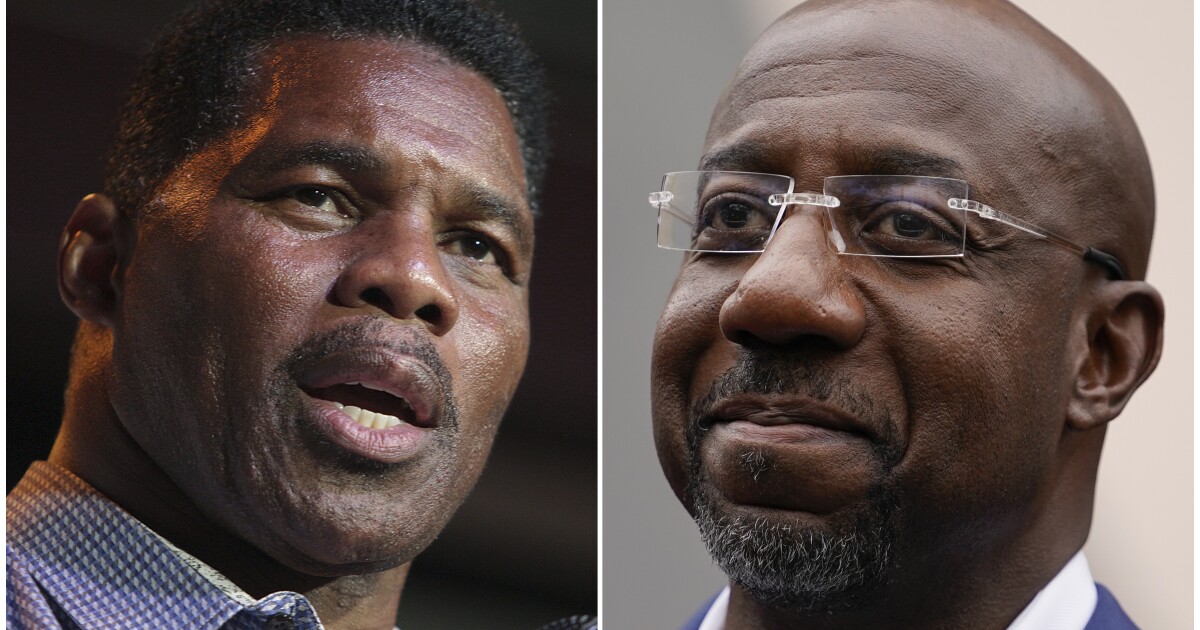

Sen. Raphael Warnock (D-GA) won reelection Tuesday, fending off a spirited challenge from Republican Herschel Walker while helping Democrats grow their thin Senate majority in the midterm elections after a bruising four-week runoff campaign.
Warnock was leading Walker 50.4% to 49.6% when the race was called, earning the senator his first full six-year term after ousting an appointed Republican incumbent in a special election runoff nearly two years ago. Walker’s defeat was a major blow to the Republicans. They capped a disappointing midterm election season with yet another loss that effectively surrendered a Senate seat to the Democrats, who saw their majority grow from 50 to 51.
Republicans entered the Nov. 8 midterm elections expecting to ride a red wave to a pickup of at least one, but possibly five, Senate seats. But one by one, GOP opportunities dropped off the board.
Democratic incumbents presumed vulnerable won reelection in Arizona, Colorado, Nevada, New Hampshire, and Washington state, ensuring their party would at least retain its 50-seat majority, reliant on Vice President Kamala Harris’s tiebreaking vote, no matter what happened in Georgia. But after Sen.-elect John Fetterman (D-PA) flipped the seat being relinquished by retiring Sen. Pat Toomey (R-PA), Warnock became the Democrat’s path to an outright majority of 51.
The Georgia Democrat finished ahead of Walker after all the votes were counted from Nov. 8, leading his Republican challenger 49.4% to 48.5% and withstanding political headwinds generated by President Joe Biden’s low job approval ratings and Georgia Gov. Brian Kemp’s (R) 53.4% to 45.9% thrashing of Democratic challenger Stacey Abrams. But Warnock was forced into a four-week runoff campaign, having fallen short of 50%, as required under state law.
SPLIT-TICKET VOTING HELPED BRING ON GOP MIDTERM DEMISE, REPUBLICAN FIRM FINDS
Round two of the battle for this Georgia Senate seat was vicious. Both Warnock and Walker, and the groups supporting them, spent millions on attack advertising across television, radio, and digital platforms, raising questions about the candidates’ character and personal lives. According to OpenSecrets, outside groups had spent a combined $60 million to influence Georgia voters in the runoff campaign. The majority of that cash was spent against Walker.
Democratic groups pounded Walker over a troubled personal life years ago that included multiple allegations of threats of violence against women, some of which was previously disclosed by the Republican, some of which was not. Walker, meanwhile, mounted an “Evict Warnock” bus tour, alluding to reports that the church the Democrat is affiliated with as a pastor has evicted poor residents from a housing complex it owns while providing the senator with a generous housing allowance.
“Warnock’s church is giving him more than $7,400 a month for a housing allowance (plus over $120,000 a year in salary and benefits), but is evicting people for owing less than $30 in past-due rent,” the Republican National Committee said in a press release, among several the GOP issued hitting Warnock nearly every day of the runoff campaign.
The pro-Warnock attacks on Walker often resembled something along the lines of a television spot aired late in the race by Georgia Honor, a super PAC affiliated with Senate Majority PAC, the super PAC aligned with Senate Majority Leader Chuck Schumer (D-NY).
“Herschel Walker’s violence has hurt so many people,” the advertisement’s voiceover says as the spot opens before playing clips of the Republican’s past romantic partners recounting the allegations against him. The ad closes with the voiceover saying, “Herschel Walker doesn’t belong in the Senate.”
CLICK HERE TO READ MORE FROM THE WASHINGTON EXAMINER
Walker, 60, was a folk hero in Georgia when former President Donald Trump recruited him to challenge Warnock.
The charismatic former professional football player was a Heisman Trophy-winning running back who led the University of Georgia to a national championship in 1980 and has been beloved in the state ever since, drawing crowds seeking autographs and selfies wherever he appeared. Walker cruised to victory in the GOP primary, smoking his competitors, among them Georgia Agriculture Commissioner Gary Black. Walker failed to repeat that success against Warnock.
The likable Democrat projected a centrist image that belied his liberal voting record in the Senate. Backed by more than $150 million Warnock raised for his reelection bid, the senator was able to capitalize on doubts about Walker’s fitness for office to preserve his party’s hold on both of Georgia’s Senate seats.






